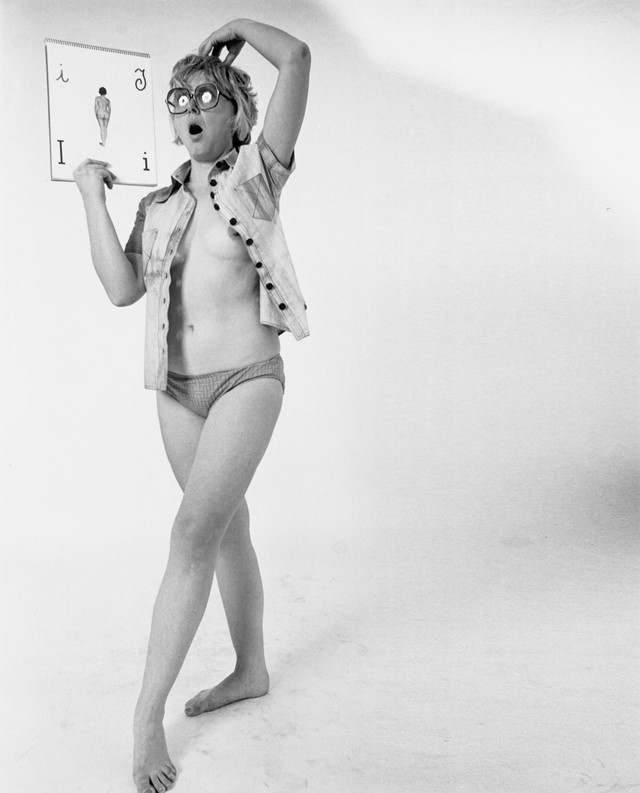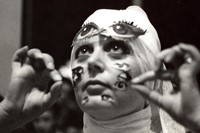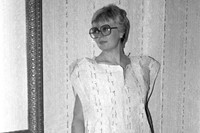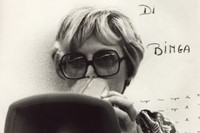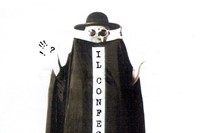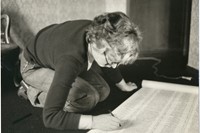As Tomaso Binga returns to Artissima, Turin, with two new works, we look at the complex and controversial legacy of the legendary Italian performance artist
Who? Italian artist Bianca Pucciarelli Menna was born in Salerno, 1931. She was born again as Tomaso Binga in Rome, 1977. On a hot day in June, Menna married her alter ego; she had been making art in the 1960s, but in the midst of the feminist movement of the 1970s, decided to take a male name to highlight gender inequality. A leading figure of the verbo-visual poetry movement, she found inspiration in Italian Futurism and concrete poetry, specifically the poet Filippo Tommaso Marinetti, who inspired her chosen name.
Language is a gendered arena. In Italian, masculinity is a permanent fixture. A group of boys and girls will always be ragazzi – the word for ‘boys’ or ‘guys’ – even if there is only one boy for hundreds of girls. A bride and groom will always be gli sposi, the woman’s identity subjugated to male power. This is why Binga’s 1977 performance piece, Oggi Spose, shocked its audience: the inviation declared Bianca Menna and Tomaso Binga “just married” (oggi spose), but had altered the traditional phrase (oggi sposi) and its use of the masculine sposi by replacing it with the feminine spose. The bride was also the groom; Binga wore bell-bottom trousers and an embroidered white shirt. It was art but also an awakening.
What? After her first solo exhibition in the UK earlier this year at Mimosa House, for Artissima (think: Italy’s Frieze) Binga is back with two new performances. Il Confessore Elettronico (The Electronic Confessor) and La moglie del Cardinale (The Cardinal’s Wife) are both collaborations with Franco Curletto, a renowned Italian hairstylist. Binga is reluctant to give details: “I can only say that I am terribly curious and impatient to approach this new performance experience, an unusual one for me. I have always believed in group work and the communion of languages.”
At first she “relied only on gesture” for performances; take Vista Zero (1972) in which she attached delicate paper eyes to her face. Gesture developed into an enactment of language via “semantic” writing, an automatic, illegible script: “subliminal and silent”. She started to play with formal constraints of Italian, as in Ti scrivo solo di Domenica (I Write You Only on Sunday), where a woman is only able to communicate on the one weekday that is gendered female. Language becomes a boundary, a limit, a cage.
“All my visual work has been correlated, from the outset, with my poetic-sound performances,” Binga notes. “The practice of art as writing, which has accompanied my entire career, found an almost organic outlet in the use of speech, gesture and body.” This physicality is palpable in her collage series Mural Alfabetiere, where Binga combines the letters of the alphabet with her naked body, suppressing and reinventing it by forming the architecture of language in her own image: “My body is also the body of the word,” she proclaimed. “I am not a man / I am not a poetess.” Earlier this year designer Maria Grazia Chiuri invited Binga to recreate the series for the set of Dior’s Autumn/Winter 2019 show. Binga was delighted to collaborate: “Fashion is art that dresses us and impacts us from birth,” she said. Identity, Binga understands, is fluid.
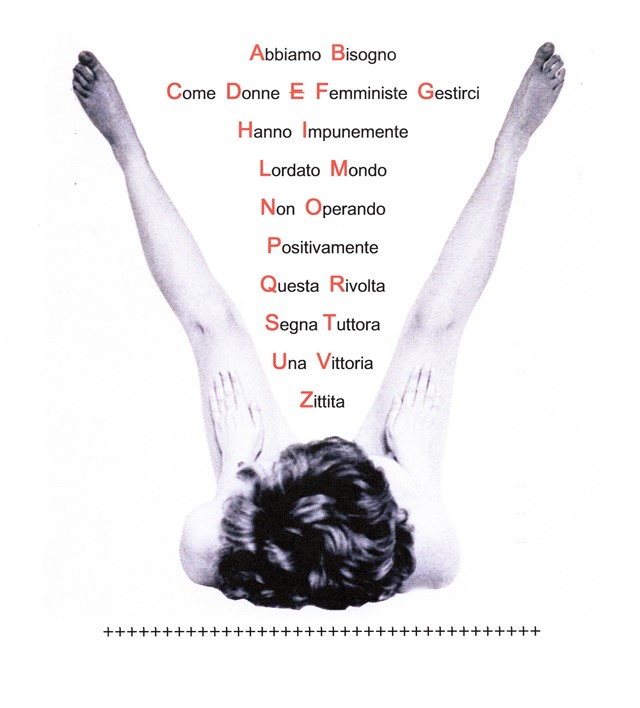
Why? Binga’s identity politics were not always taken seriously. When she created Oggi Spose its critical importance was lost: “back then it seemed like a game, a prank, a pantomime”. Today, she’s glad it retains “provocative potential”, though “the path to equality is still a long one!”
Language and its visible expression is central to Binga’s work. “Poetry has played a not only important but decisive role in my life and my artistic growth,” she admits. Recently she picked up a book by Marinetti and its transportive power took hold: “I opened it and I began reading… I stopped cleaning and organising… I even forgot to eat!” It is this miraculous ability for words to overpower and destabilise the practicalities of life that interests Binga. To her, poetry is “extension of thought” – “traces of dazzling images that etch themselves into the depths of our mind”. Language can insert itself into our lives and detach us from the world; Binga’s art seeks the same effect.
Artissima runs from November 1 – 3, 2019 in Turin, Italy. Tomaso Binga will perform on November 1, 2019.
